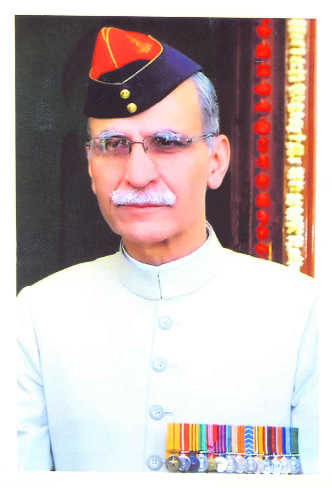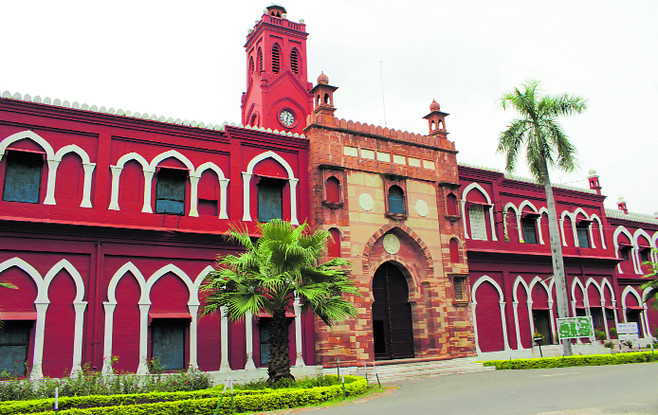Rana Siddiqui Zaman
In an exclusive interview to The Tribune, Lieut-Gen Zameer Uddin Shah, the “controversial” Vice Chancellor of Aligarh Muslim University, talks of his effort to open centres of AMU in the face of the humiliating attitude of the Human Resource Development Minister.

Lieut-Gen Zameer Uddin Shah, AMU Vice-Chancellor

The best reply to an insult is to maintain a dignified silence. This is what Lieutenant-General Zameer Uddin Shah, the “controversial” Aligarh Muslim University Vice Chancellor did just a few days ago, when he was humiliatingly snubbed by our literate, Human Resource Development (HRD) Minister, Smriti Irani. The reason? The HRD Ministry had decided to shut down five AMU education centres, spread across the country’s underprivileged hamlets in Mallapuram (Kerala), Murshidabad (West Bengal) and Kishanganj (Bihar) and the proposed ones in Madhya Pradesh and Rajasthan. The three centres — Mallapuram, Murshidabad and Kishanganj — are functional, albeit on a shoe-string budget. Kerala Chief Minister Oomen Chandy had invited Shah to a meeting in Irani’s office for talking about funds for these centres. When Shah, after clarifying to the officials of the HRD Ministry that he had been invited by the CM for this meeting, entered her office, she asked curtly, “Who let you in?” Red-faced, Shah replied, pointing out at Chandy, “The honourable Chief Minister has invited me to be a part of this meeting.” But to his and the Chief Minister’s shock, she snubbed Shah, asking, “Who will decide who should be in the meeting? Who pays your salary? the Kerala CM or the HRD Ministry?” A former General of the Indian Army, decorated with numerous medals, brimming with immense pride, the red-and-blue, gold-buttoned Army cap, Shah maintained a dignified silence. A Judge in the Army Court and the Deputy Chief of Army Staff, who left those coveted positions to further the best interests of young Indians by education through AMU, kept quiet. Shah, as I have known him as an AMU alumna, melts even an aggressive journalist with his humility, respect, and politeness. He does not evade any question. He escorts you till the door, opens it for you, doesn’t sit till you do, because you are a lady. He does not extend his hand to shake with a woman, which is more of his tarbiyat, a personal upbringing than an Army training (in which a hand shake is the prevalent and practised mode of greeting). He takes utmost care of his gestures while talking. He lowers his gaze often, talks softly, a khandani trait as I can aptly put it. That Shah didn’t react to the humiliation is a khandani attribute, of course. The talks started. The Vice Chancellor had come prepared. Shah, told me in an exclusive interview at the Vice Chancellor Lodge, AMU, Aligarh, a day after his meeting with the HRD Minister and the Prime Minister, “I was told that some of my detractors within AMU, who were against these centres, had reportedly informed the HRD Minister that these centres are ‘illegal’. This was believed without any investigation. I was informed that they, therefore, wanted to shut down the functional as well as the proposed centres. “The proposal for AMU centres that I submitted, had been approved by the highest policy-making bodies, the AMU Executive Council and Court, the Government of India and the Visitor (President of India). The AMU Act 1920 (as amended) permits these centres under Section 12 (2) of the Act. Where did this ‘illegal’ angle spring from? It’s a rumour extracted from Act 12 (2) of AMU, which says that within 12 miles of the university mosque, the university cannot establish a school. “This was a British Act, to keep Muslims confined. But, the same Act also mentions that you can ‘establish centres’, something that has a sanction of even the Government of India.” Without investigating, the HRD Minister said it was ‘illegal’!” Significantly, the centres in MP and Rajasthan have not even been opened. The reason? When the Kishanganj Centre was opened a few years ago, some locals had protested and tried erecting a temple there, allegedly taking the centre as a means for some communal (read terrorist) activities. “The police threw them out. After that, the parliamentary committee on education, grilled me, and said, “These centres are leading to communal violence. So, no more centres please!” This grilling and full-stop on more centres was done without any investigation by the HRD Ministry. Furthermore, the governments of Rajasthan and MP did not take interest in the other two centres. Maharashtra, however, is keen on it though,” Shah revealed. Shah also presented the figures of how inadequate are the funds for the centres, established after sanctions by the Central Government. “After protracted efforts, a paltry sum of Rs 45 crore was sanctioned for three centres, which is grossly inadequate. As a result, hardly any construction /improvement is possible in these centres,” he submitted. Significantly, more humiliation was on the way. The next point at the meeting was on the inadequate funding of AMU. Banraras Hindu University, the same size as AMU, gets Rs 300 crore while AMU gets Rs 193 crore, even Jamia Millia Islamia, quarter the size of AMU, gets Rs 235 crore. While presenting these facts, the VC submitted, “AMU despite being among the high-ranking…” Before Shah could complete the sentence, Irani, snubbed him again, saying, “I know how these rankings are obtained…” He politely added, “Madam, these rankings are done on ‘The Best Global Universities in India’ by two international ranking agencies — the Times Higher Education, London, and the US News and World Report. The former ranked AMU as 90th-best Asian University, eighth-best Indian higher education institute and second-best Indian university. The US News has placed it as the sixth-best university among top 10 in India. Plus, the UGC’s National Assessment Accreditation Council (NAAC) gave AMU a grade of point 3.35 out of 4, that has been achieved only by a handful of universities…” The HRD Minister, who is eloquent and does her homework before making a speech in public or Parliament, wasn’t perhaps ready for it. A wise man once said that if you cannot cut a line shorter, draw a bigger line close to it. The other line will get shortened automatically. Shah proved it with his homework. Irani’s line clearly stood small. This document was submitted to the HRD Minister and the Prime Minister. Since the VC had also met the Prime Minister on this issue and that of minority character, he said, “The Prime Minister’s body language was positive. So, I hope my next meeting with the HRD Ministry will just be a formality.” He was right. The March 10 meeting of the VC with the HRD Ministry “was satisfactory”. But, again, Irani pointed out to the VC that no research work was being carried at the three AMU centres, to which the VC replied that research work would begin once funds were made available. She then urged the VC to meet Joint Secretary, MHRD, S S. Sandhu, who was also present at the meeting. Sandhu “assured” him that the funds approved by the Expenditure Finance Committee will be made available to the university “soon”. Whenever this “soon” happens, the big question is: what made Irani behave so irresponsibly with a learned Vice Chancellor, that too repeatedly when even the Prime Minister was “sympathetic, positive and respectful” to him?The VC said politely, “I don’t want to say anything. All I know is, for the better part of my life, I fought for my country, including in the 1971 war, managed insurgencies and controlled communal riots. It will take much more than that to humiliate me!” Sixtyseven-year-old Shah added: “In the Army, we are taught to respect women. Let’s focus on more important work. It does not affect me…” It has affected me, respected Vice Chancellor. It should affect everyone who works with integrity. My conscience got worked up. It happens only in India!The writer is a Delhi-based critic.
